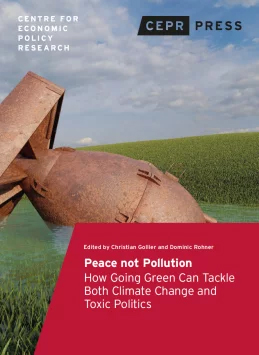Contribution by Mathieu Couttenier, Professor at ENS de Lyon, Center for Economic Research on Governance, Inequality and Conflict, in the book Peace not Pollution: How Going Green Can Tackle Climate Change and Toxic Politics, June 29, 2023.
 Mathieu Couttenier, 'Mineral extraction and conflict in the era of green technologies: Implications and consequences', in Christian Gollier and Dominic Rohner (eds), Peace not Pollution: How Going Green Can Tackle Climate Change and Toxic Politics, CEPR Press, London. June 29, 2023. pp. 213-219.
Mathieu Couttenier, 'Mineral extraction and conflict in the era of green technologies: Implications and consequences', in Christian Gollier and Dominic Rohner (eds), Peace not Pollution: How Going Green Can Tackle Climate Change and Toxic Politics, CEPR Press, London. June 29, 2023. pp. 213-219.
The accelerating transition to a low-carbon economy has led to the rapid adoption of green technologies (such as wind turbines, solar panels and energy storage). For example, the global number of electric vehicles tripled between 2018 and 2022 (to 16 million) and the International Energy Agency (IEA) estimates that there will be 200 million electric vehicles on the road in 2030 (IEA 20220, leading to a drastic increase in battery demand. While estimates are highly dependent on the stringency of climate policies and the assumptions of the scenarios, the annual demand for minerals by clean energy companies is predicted to double or even quadruple by 2040 (IEA 2021). The rapid expansion of the green technology industry and the resulting surge in demand for minerals raises significant concerns about the potential socioeconomic implications for mineral-producing countries. These concerns are compounded by the historical precedent of resource-rich nations bearing the brunt of the negative effects of global economic shifts. It is therefore imperative to address the urgent need for equitable and sustainable practices in the mining sector to ensure that the transition to a low-carbon economy benefits all nations, regardless of their resource endowments.






